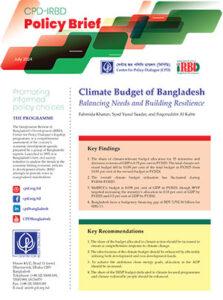 Bangladesh stands at the forefront of the global fight against climate change, facing immense challenges due to its geographical vulnerability. Bangladesh’s climate-related disasters wreak havoc on the economy and society, impacting livelihoods in far-reaching ways. The direct impact includes economic losses such as infrastructural damage, disrupted agricultural activities, climate-induced migration and the slowdown of economic growth (Hossain et al., 2022; Thurlow et al., 2012; Roy & Haider, 2018; Hossain et al., 2019). Indirect impacts of climate-related disasters are evident across various social spheres. These include exacerbating gender inequalities, as women and girls are disproportionately affected; reducing educational hours due to climate-related disruptions; and increasing the incidence of child marriage, as families pursue economic stability amidst environmental uncertainties (Eastin, 2018; Reggers, 2019; Rainard et al., 2023).
Bangladesh stands at the forefront of the global fight against climate change, facing immense challenges due to its geographical vulnerability. Bangladesh’s climate-related disasters wreak havoc on the economy and society, impacting livelihoods in far-reaching ways. The direct impact includes economic losses such as infrastructural damage, disrupted agricultural activities, climate-induced migration and the slowdown of economic growth (Hossain et al., 2022; Thurlow et al., 2012; Roy & Haider, 2018; Hossain et al., 2019). Indirect impacts of climate-related disasters are evident across various social spheres. These include exacerbating gender inequalities, as women and girls are disproportionately affected; reducing educational hours due to climate-related disruptions; and increasing the incidence of child marriage, as families pursue economic stability amidst environmental uncertainties (Eastin, 2018; Reggers, 2019; Rainard et al., 2023).
Authors: Fahmida Khatun, Syed Yusuf Saadat, and Foqoruddin Al Kabir
Publication Period: July 2024



